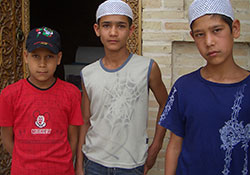Health and human rights

WHO/Malin Bring
Promoting and protecting health and respecting, protecting and fulfilling human rights are inseparably connected.
Violations or lack of attention to human rights can have direct and serious health consequences. This is particularly apparent for certain severe civil and political human rights violations, such as torture, trafficking in persons, violence against women and children, imprisonment under inhumane conditions, summary and arbitrary executions. These types of human rights violations obviously have an impact on a person’s physical and mental health, and might lead to life-long suffering or death.
Human rights provide a useful framework to identify and respond directly to the underlying determinants of health, i.e. the “conditions in which people can be healthy”. This relates to the process of ensuring that freedom from discrimination and the right to information, privacy and participation are respected in the ways health policies and programmes are designed, monitored, implemented and evaluated. Vulnerability to ill health can further be reduced by taking steps to ensure access to education, adequate food, housing and work.
In the Tallinn Charter on Health Systems for Health and Wealth (2008), Member States of the WHO European Region renewed their commitment to human rights norms such as solidarity, equity, participation, transparency and accountability. WHO/Europe works to support Member States in furthering these values through health policy and within their health systems.



